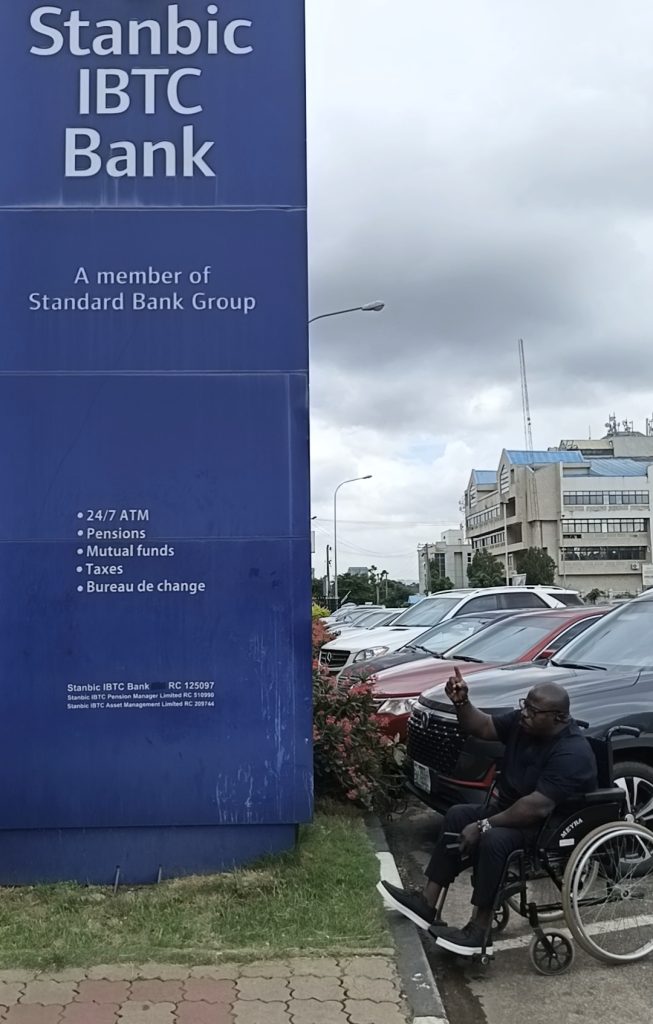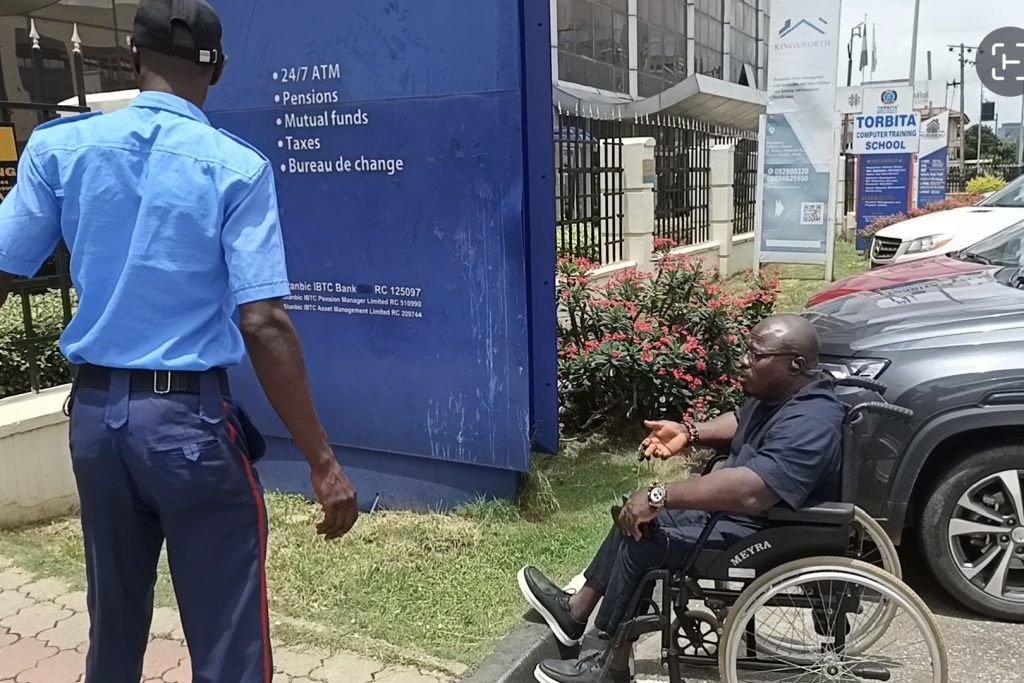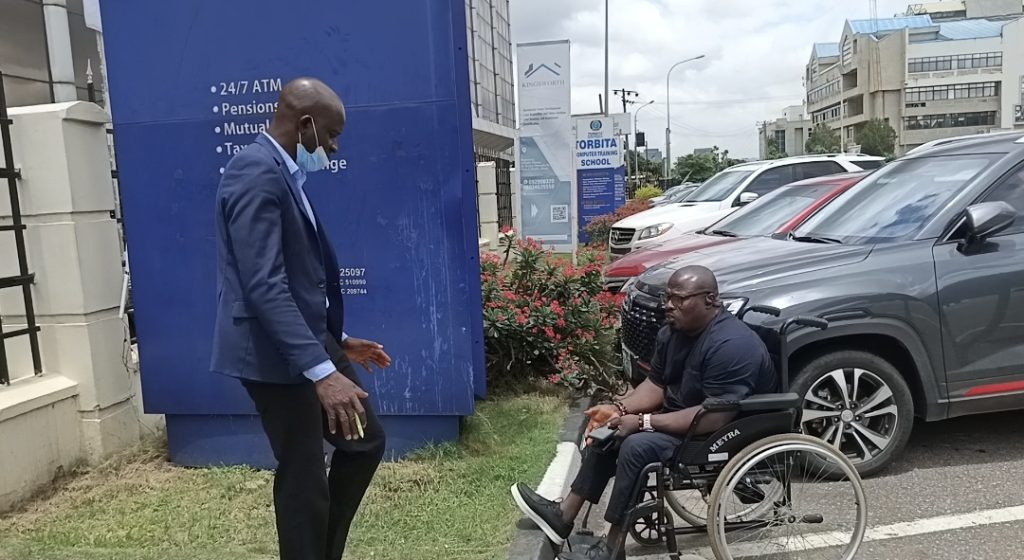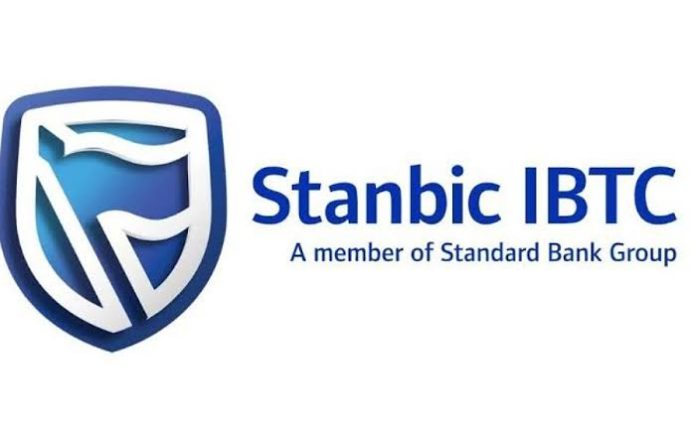In a troubling incident at Stanbic IBTC’s Area 3, Garki Branch, Abuja, a wheelchair user, Comrade Chris Agbo, was subjected to blatant discrimination by the bank’s staff on September 18, 2024. The incident unfolded between 11:45 a.m. and 2:15 p.m., highlighting ongoing accessibility challenges faced by persons with disabilities in Nigeria, despite the existence of laws meant to protect their rights.
Comrade Agbo who is a journalist and disability rights advocate had initially planned to visit the nearby NNPC filling station for fuel but decided to stop at the bank first to activate his ATM card. Unable to access the bank’s facilities due to a lack of ramps, he sent his aide inside to request assistance. However, she was informed that the bank’s ATM machine was not working. Left with no other option, Agbo asked his aide to request a withdrawal slip so he could withdraw money from the banking hall. Unfortunately, what should have been a simple transaction turned into a long, frustrating ordeal.

Bank Manager Suggests Comrade Agbo Visit Another Branch
Upon sending his aide back into the hall to ask for assistance, the bank manager informed her that the branch was not equipped with a ramp to accommodate wheelchair users and suggested that Comrade Agbo should visit the Maitama Branch instead, where accessibility features such as ramps were available. This recommendation was not only insensitive but also impractical, as Agbo’s vehicle had no fuel, and he was unable to drive to the other branch.
From 11:30 a.m. until nearly 1:00 p.m., Comrade Agbo was stranded outside the bank entrance, waiting for someone from the staff to assist him. Despite his visible distress and the urgency of his situation, none of the bank staff took action. A fellow customer, who happened to be a banker at another institution, even attempted to intervene on Agbo’s behalf, but the Stanbic IBTC staff remained unyielding.
The two security guards at the bank repeatedly relayed the manager’s stance, insisting that Comrade Agbo would have to go to the Maitama Branch to access his money. They made no effort to accommodate his needs or offer an alternative solution.
Intervention from a Policeman
It was only after Comrade Agbo began recording the situation on his phone that the bank staff became uneasy. His confrontation with the security guards drew the attention of the police officer stationed at the bank, who eventually intervened. The officer entered the bank and explained the situation to the staff inside. It wasn’t until 1:06 p.m. that bank staff finally came out to assist Comrade Agbo.
Even then, their attitude was less than professional. They provided the service as though it were a favor rather than a basic right, and no apology was offered for the initial refusal to assist him. The branch manager, whose failure to act escalated the situation, made no attempt to personally apologize to Comrade Agbo for the discriminatory treatment he endured.


Violation of Disability Rights Laws
This incident is a clear violation of the Discrimination Against Persons With Disabilities (Prohibition) Act, 2018, which was enacted to protect the rights of persons with disabilities in Nigeria. Several provisions of the Act were blatantly disregarded by the staff of Stanbic IBTC:
- Section 26 of the Act stipulates that persons with disabilities must be given first consideration in queues and should be attended to outside the queue where possible.
- Section 3 asserts that persons with disabilities have the right to access public buildings and physical environments on an equal basis with others. Public buildings must be equipped with ramps, lifts, and other facilities that ensure accessibility.
- Section 4 mandates that public buildings must have the necessary accessibility aids, such as ramps or lifts, to allow persons with disabilities to access and use them.
Five years after the enactment of the law, which included a five-year moratorium for compliance with accessibility regulations, it is incumbent upon public institutions like banks to ensure that all their branches are accessible to persons with disabilities. The lack of a ramp at Stanbic IBTC’s Area 3 branch, and the refusal of staff to assist a customer with a disability, underscores a broader issue of non-compliance with the law and the continued marginalization of persons with disabilities.
A Call for Accountability and Change
The behavior exhibited by the staff of Stanbic IBTC not only reflects poorly on the bank but also sets a dangerous precedent for how persons with disabilities are treated in public spaces. This type of discrimination is unacceptable in any setting, particularly in a country where the law is clear on the rights of persons with disabilities.
Comrade Chris Agbo’s experience highlights the urgent need for stronger enforcement of the Discrimination Against Persons With Disabilities Act, as well as a cultural shift in how businesses and public institutions treat individuals with disabilities. Banks and other public service providers must recognize that accessibility is not an option—it is a legal requirement. Moreover, it is a basic human right that should be upheld without question.
Conclusion
This incident at Stanbic IBTC serves as a reminder that despite the progress made in disability rights legislation, much work remains to be done to ensure that persons with disabilities can access services without discrimination. Banks and other institutions must take proactive steps to ensure full compliance with accessibility laws and foster a culture of inclusion.
Stanbic IBTC, as one of Nigeria’s leading financial institutions, must take responsibility for this incident and work towards ensuring that all its branches are accessible to all customers, regardless of their physical abilities. It is crucial for the bank to review its policies, provide sensitivity training for staff, and make the necessary infrastructural adjustments to prevent such incidents in the future.
Disability rights are human rights, and it is time for all public institutions to recognize and respect this fundamental truth.


